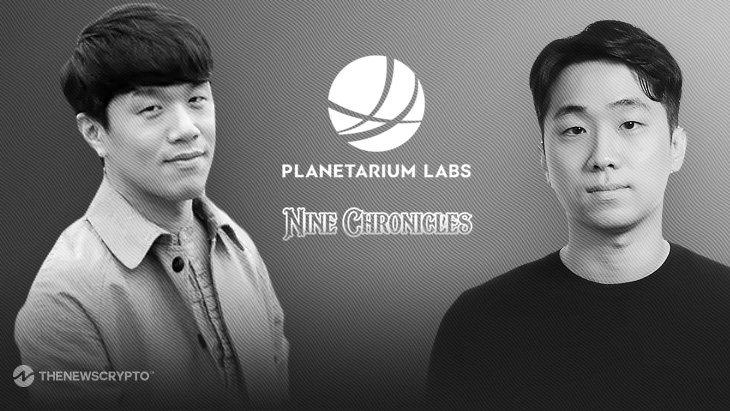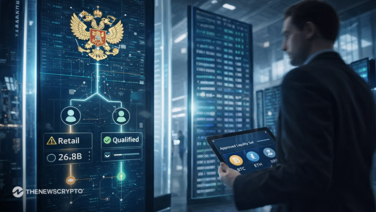From HTML games, and Web2 games to the emerging Web3 games, the gaming landscape has observed multiple paradigm shifts over these years. Forging synergy between the gaming industry and the core element of Web3 — decentralization — marked a transformative step. The intriguing Web3 MMORPGs (massively multiplayer online role-playing games), is it a revolution or an unstoppable evolution?
To uncover the answer, TheNewsCrypto had an exclusive interview with JC Kim and Kijun Seo, co-founders of Planetarium Labs, the parent company of Nine Chronicles, a leading fantasy-based MMORPG. As experimenters of different trends in the gaming realm, the guests highlight every single aspect of Web3 MMORPGs, including the ecosystem, tokenomics, new opportunities for users, and their accompanying intricacies. Furthermore, as the discussion unfolded, they conveyed their excitement for the next chapter: the mobile iteration of Nine Chronicles.
This conversation with Nine Chronicles will help you all understand the fundamentals of Web3 MMORPGs.
TheNewsCrypto: Can you share the story behind your entry into the Web3 MMORPG landscape?
JCK Kim (JCK): Kijun Seo and I have been close friends for many years, collaborating on various hobby projects. Our first venture, Nine Chronicles, started out as an open-source game. Our primary motivation was to replicate the decentralized nature of Bitcoin in gaming. Bitcoin operates without relying on any people or country—anyone can run a node and examine its records. We aim to create an MMO (massively multiplayer online) game world with a blockchain-based user history where anyone can participate and contribute. Around five years ago, we initiated this mission. Our current team of 60 people, mostly in South Korea and Singapore, collaborates with over 20 Web3 gaming companies on ambitious game projects.
Kijun Seo (KS): JC Kim and I met in our early 20s and we ended up talking about how blockchains work as a world computer. The idea of hosting an entire game world on this technology, ensuring transparency of rules and data, took shape. What began as a small project, Nine Chronicles exceeded our expectations. Currently, we’re moving closer to the game’s upcoming launch which would give more freedom and unlock more capabilities for people to build and engage in game worlds as they wish.
TheNewsCrypto: Can you introduce us to Nine Chronicles and what inspired its creation?
JCK: Nine Chronicles is the first fully on-chain, open-source role-playing game. Anyone can download the source code from our GitHub, expanding and modifying the game independently. Significantly, it doesn’t depend on our company. The world of Nine Chronicles remains eternal to every single player who wants to play the game.
Every user’s transaction is recorded on the Nine Chronicles’ native blockchain, not on our private server. As a result, we have designed our game ecosystem and economy without relying on our privileges. Anyone wanting to advance in the game needs to find materials from the dungeons based on protocol rules.
Players, including ourselves, must farm materials from the dungeons to create gears. If we want to supply them, we need to trade through our decentralized in-game marketplace. This upholds the decentralized ecosystem and economy of Nine Chronicles.
KS: We draw inspiration from Nordic mythologies fused with feline themes. With continuous updates for over three years, users will get to discover a diverse range of content to gear up, engage in battles, and connect with others within the network.
TheNewsCrypto: Interestingly, the game’s chains are named after famous Asgadians: Odin and ‘Heimdall’. Can you explain to us more about ‘LibPlanet’, your native game engine of Nine Chronicles?
KS: What’s really interesting about Libplanet is that you’re building an application-specific blockchain using ‘C#’, which is the language of choice for the Unity engine, the most widely used game engine in the world. One uses Unity and C# to build a network that processes all user actions, such as trading, entering dungeons, battles, and receiving rewards. These actions are not just saved but also verified or even run as simulations by the blockchain itself.
The reason we decided to launch a new chain, Heimdall, is to tap into a mobile user base and make it larger than the PC user base. Night Chronicles was also designed for mobile, and launching on a new chain allows us to reach a new set of users eager to explore this new world.
This move represents a natural evolution for the game, moving away from being the sole guardians running the chain to allowing gamers to organize themselves. Players can now initiate new chains, naming them after guardians from the Asgardian galaxy. This approach allows users to power the chain, reducing reliance on us for infrastructure and running the game. This shift opens up capacity for more users and ensures a fair starting point for new players. It also unlocks the future of new worlds and chains to the player base.
TheNewsCrypto: How revolutionary do you find the blend of blockchain, crypto, and NFTs in gaming?
KS: It is undoubtedly a revolutionary evolution. Gaming has always been about communities, even back in the Nintendo days. Playing Super Mario, people would discover things in magazines and discuss them in schools.
Online gaming started evolving into data-powered societies with rules, engagement, and interactions. One thing that players were missing was open governance and transparent data available to them. The data, rules, and all the gameplay simulations were always set inside private networks that had the power to change or even erase their accounts for any reason. And I think, as a society, gaining data and all these are becoming more like identities in a digital world.
The evolution was somewhat foreseen. Many people wanted public infrastructure to power their social engagement inside games. Therefore, it marks a revolution, indicating the infrastructure’s self-realization.
JCK: Providing ownership to the gamers’ community is the most significant thing using blockchain technology. Besides asset ownership, we can share the network or IP revenue through tokenomics and the on-chain ecosystem. We aim to treat the community as a global family of IPs.
We expect many great things to happen in the next one or two years. More games are now ready to scale and revolutionize the gaming industry.
TheNewsCrypto: From your perspective, what trends do you expect to see in the web3 gaming landscape?
KS: One of the most interesting aspects in the first phase of blockchain gaming, it was all about crypto—having dual tokenomics and distributing it. Over time, blockchain games have evolved so much that we’re blending Web2 and Web3 together. We’re considering tokenomics that bridge fiat expenditures and encourage people to invest in the game, aiming for longevity and widespread mass adoption.
Instead of forcing everyone to accumulate crypto and jump on the bandwagon, we are trying to engage billions of gamers in a space where blockchain powers the backend. However, it’s done in a nuanced way, enhancing the ecosystem and the economy. I believe this approach will emerge in the next set of blockchain games targeted toward mass adoption. These games will include in-app purchases, credit card payments, IAPs, and other features but will run on top of very advanced tokenomics.
I believe we are on the verge of crossing the threshold where much of this knowledge will apply not only to web2 games but to online games in general.
JCK: Next year, Web3 games will be integrated into conventional gaming spaces. We can see it coming as most listed gaming companies in South Korea have started creating their Web3 gaming projects.
After the App Store and Google Play Store opened their doors to support NFT-related games, we can introduce the Web3 aspect of the game to normal and mass users using these channels. There are many ways to support this very easily without buying tokens from crypto exchanges and bringing them into personal ledgers.
We can eliminate various other steps within one year, and most of them are already happening right now. Even Nine Chronicles does not require any Web3 elements for gamers. They can simply download the game from Google and Apple Store and use in-app purchases, integrated with their credit cards for payments.
TheNewsCrypto: How do the tokenomics within Nine Chronicles benefit its users?
JCK: Within Nine Chronicles, NCG is not only a utility token but also a governance and ownership token. Users can stake their NCG to the game, earning and producing core, rare items. For instance, if users want to extend or reduce playtime, they can acquire AP potions and hourglasses by holding and staking NCG tokens. These items are not directly sold by the company. Similar to players, we also need to stake game tokens to produce these items or assets.
As the network revenue grows and more users join based on the rarity of those items, values increase, and all users can benefit. Sharing ownership means sharing in the net revenue. NCG stakers play a core role in the game’s decision-making process. We present agendas to the community, and using their stake or NCG tokens, they can make crucial decisions, such as deploying rare items in collections or determining the production of materials in new dungeons.
TheNewsCrypto: Can you tell us more about the native NFT collection — Decentralized Cats (D:CC)?
JCK: D:CC is a multifunctional NFT. People use these NFTs not only as profile pictures (PFP), displaying them on platforms like Twitter or Telegram but also within the core gameplay. They deploy them as profile pictures for their characters and play with them in the game. Additionally, D:CC offers staking features. When users stake D:CC, they earn additional materials usable through the game protocol. If they bring these materials back into the game, they can also produce pets. Some of these pets contribute to item creation within the game. Therefore, D:CC is very functional and useful.
TheNewsCrypto: Is interoperability currently an enabled aspect of the Nine Chronicles ecosystem?
KS: We want the game’s vital things, like NCG or the D:CC NFTs, to be able to transition from one network to another. The NCG token is also an omni-chain token currently hosted on LayerZero and also on the BNB chain. The idea behind this is that items carrying specific value, such as an identity in the entire Nine Chronicles ecosystem, should be able to move across chains.
However, for some things, it’s preferable to exist within a specific chain, perhaps due to bandwidth issues or to ensure user fairness within that ecosystem. Essentially, as we build the community, users should have the ability to choose which data is transferable and which should remain within specific chains for reasons of competition or fairness.
Although LibPlanet is not an EVM chain, we are concentrating on compatibility with EVM chains. For example, we have a game called BNB Chronicles on the chain, which currently ranks in the top five in the BNB chain in terms of daily active users (DAU).
Our goal is to further push that dynamic and to easily have access and support for NCGs on other EVM-supported chains as well, particularly after the integration with LayerZero. We are primarily focusing on chains with high liquidity, but we are open to collaboration with different platforms and chains that also align with our principles of open source and on-chain data.
TheNewsCrypto: In 2022, Nine Chronicles teamed up with key industry players like Binance Labs and Animoca Brands. Can provide us hints regarding upcoming collaborations in the project’s pipeline?
JCK: The collaborations are mostly about POS (proof-of-stake) transitions right now. Nine Chronicles started from POW (proof-of-work) but it was very slow. So we moved from it to POS. For the POS transition, we are in talks with gaming and blockchain companies for validator partners. We would be announcing them within a year.
TheNewsCrypto: What do you foresee for the evolution of Web3 gaming?
KS: Building a game company is hard. Coming up with a game that genuinely reaches users and building a community is even harder. With so much investment flowing into Web3, people had this idea that attaching a token to the game would make it fly off, but it really hasn’t happened for many followers. I think what we could learn more about as an industry, is to make games that have a specific edge and cater to players drawn to that edge.
In the case of Nine Chronicles, the idea of players running nodes and owning their data stood out, attracting a specific kind of user base. We then started building more user-friendly features. Finding your edge is an existential question that game companies eventually have to face, and I think, in that way, we’re building a really good experience for the industry. Many of us are experimenting with different things and, most importantly, openly sharing our knowledge to push the boundaries.
Even with mobile games, the first generations weren’t all that great. People were like, ‘I can carry it, but why wouldn’t I play it on my PlayStation or Xbox or Nintendo?’ But after 5 years of mobile gaming, the gaming industry had solved a lot of these usability issues, and with that, it was able to explode.
I believe Web3 gaming has advanced in terms of adoption over the last year. The number of acquisitions is still great. It’s not like we’ve passed the initial hype cycle. We are going to have to get there where we are still creating content that caters to specific users and really has that reach.
JCK: Web3 gaming will be the fastest-growing new paradigm in the industry. Especially, the mobile game paradigm has taken a big step over seven years to go to a major level. And online games also took around eight years to become major titles. I think in Web3 games, we can make a leap to a major level within four years.
Disclaimer: The information provided in this interview article is for informational purposes only. It is not intended to be, nor should it be construed as, investment advice, financial guidance, or a recommendation to make any specific decisions. Readers are encouraged to conduct their own research.








